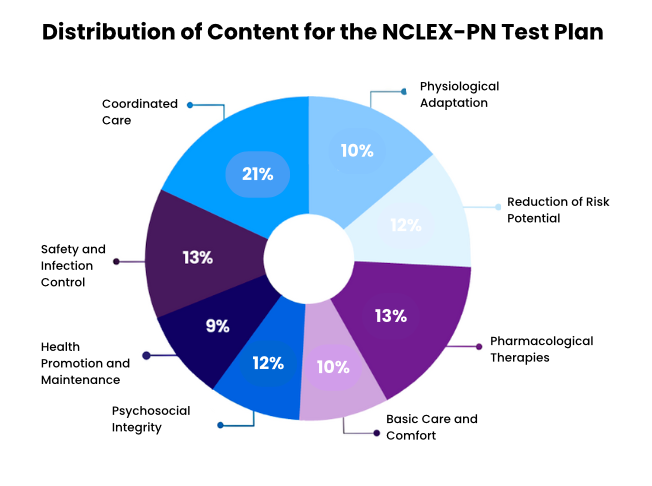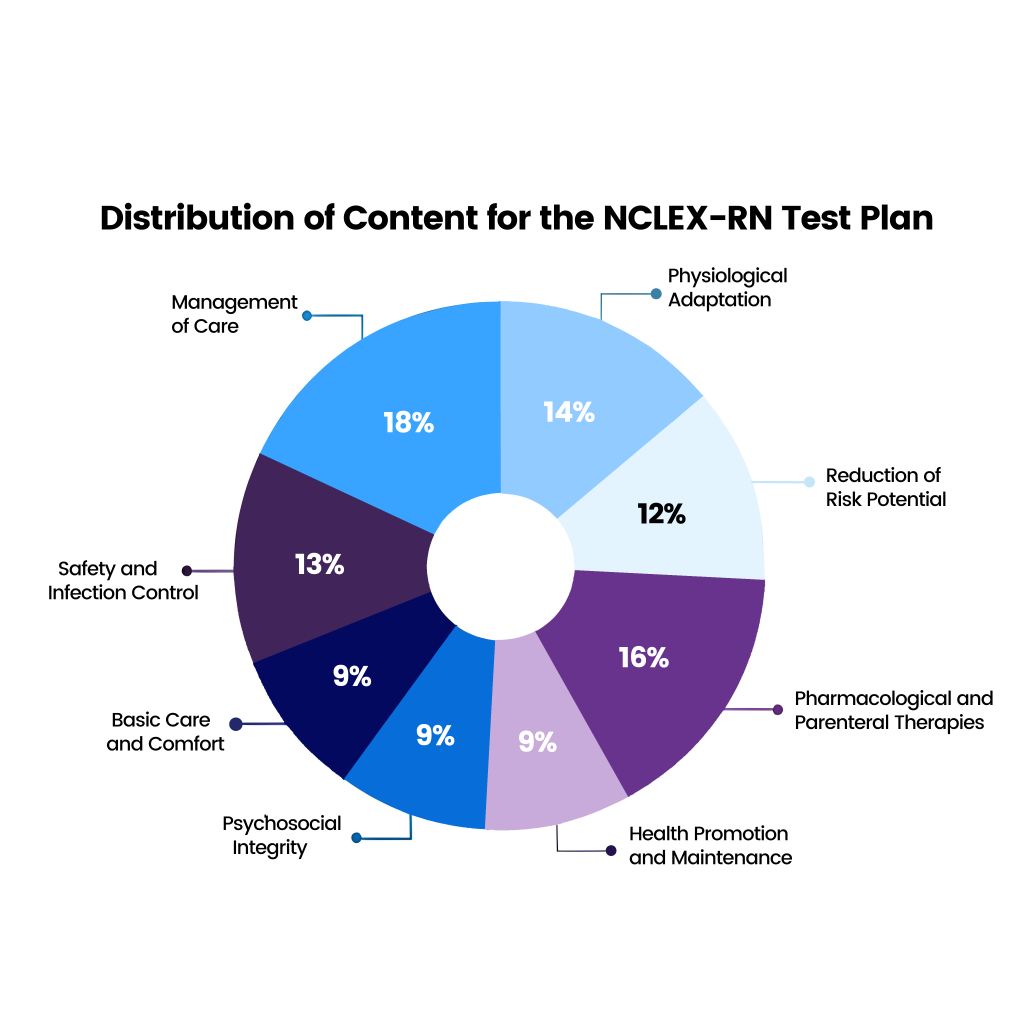
NCLEX Scoring Made Simple
Did you know that the NCLEX pass score in 2022 was 79.9%? It’s a test that can shape your nursing career. In this guide, we’re peeling back the layers of how NCLEX is scored and demystifying the process.
Whether you’re gearing up for your first attempt or aiming for a retake, we’ve got you covered. Get ready to dive into the world of how NCLEX is graded. We’ll break down the numbers and strategies that can lead you to success in one of the most critical exams of your nursing journey.
How Is the NCLEX Scored: The Basics
The NCLEX utilizes a strict pass-or-fail system, and computer-adaptive testing determines the questions. That means that the difficulty of the questions adapts based on your responses. If you answer a question correctly, the computer presents a more challenging one; if you answer correctly, the questions become easier. The goal is to continuously assess your knowledge until the computer is 95% confident in your ability.
How Does the NCLEX Scoring Work: The Science
Computer-Adaptive Testing:
As mentioned above, the NCLEX scoring process involves computer-adaptive testing. For each correct answer, the computer presents a more challenging question, while for incorrect answers, the questions become less difficult. This dynamic process continues until the computer is highly confident in your abilities.
Passing Score Calculation:
A mathematical concept known as a “logit” determines the passing NCLEX score. This number is related to the likelihood of answering a question correctly. To secure a score to pass NCLEX, you must achieve a logit of 0 or higher. Furthermore, you must score a 95% confidence interval in your abilities.
Variable Number of Questions:
The number of questions in the NCLEX exam can vary, and this variability is intentional. It allows the exam to assess your abilities with high confidence. Therefore, it’s essential to understand that the length of the test does not indicate pass or fail.
NCLEX scoring: The Passing Standard
The passing standard in the NCLEX exam represents the minimum knowledge and competency required for individuals to practice nursing safely in the United States. Therefore, understanding how this standard is determined is crucial for every NCLEX candidate.
How does NCLEX scoring work?
The passing standard is not a static number but a dynamic calculation. As such, it is continually assessed and recalibrated to ensure that it reflects the current expectations for safe nursing practice. This ongoing process also involves expert analysis and statistical evaluation.
To determine the passing standard, the National Council of State Boards of Nursing (NCSBN) uses a method known as the Modified-Angoff method. Expert nurse educators and clinicians review each test question and estimate the percentage of minimally competent candidates who would answer it correctly. These expert judgments are then used to set the passing standard.

How Can You Pass?
To pass the NCLEX, candidates must meet or exceed the passing standard set by the NCSBN. They must demonstrate the knowledge and skills to provide safe and effective nursing care.
Achieving the passing standard is not about answering a specific number of questions correctly; it’s about demonstrating a level of competency that meets or exceeds the standard. This standard ensures that all licensed nurses have the foundation to safeguard patient well-being.
It is also about understanding how NCLEX is graded. The passing standard in the NCLEX is a dynamic benchmark that reflects the current expectations for safe nursing practice. To pass the exam, candidates must meet or exceed this standard, demonstrating their competence in providing safe and effective nursing care. Understanding this standard is vital for anyone preparing for the NCLEX exam. It is also important to remember that there are different distributions for certain topics.

Understanding the NCLEX scoring process is essential for all test-takers, as it clarifies the criteria for passing and provides valuable feedback for improvement if needed.
Summing Up the NCLEX scoring
In the world of nursing, the NCLEX is your gateway to a fulfilling career. Understanding its scoring system is your map to success. Achieving the passing standard means you possess the knowledge and skills to provide safe patient care.
Remember, it’s not about the number of questions you answer but the level of competency you demonstrate.
As you embark on your NCLEX journey, stay committed to your preparation, trust the process, and aim for that passing standard. With determination and the right mindset, you’ll cross the threshold into the world of nursing, making a meaningful difference in patients’ lives.
Ready to take the next step? Contact NCLEX tutors for expert guidance today!
FAQs
1: How often is the passing standard for the NCLEX updated?
Answer: The passing standard for the NCLEX is regularly reviewed and updated by the National Council of State Boards of Nursing (NCSBN). They use a meticulous process involving expert analysis and statistical evaluation to ensure the standard aligns with the current expectations for safe nursing practice. While there isn’t a fixed schedule for updates, this continuous assessment ensures that the NCLEX remains a reliable measure of nursing competence.
2: Can I pass the NCLEX if I answer a few difficult questions correctly, even if I get many easier ones wrong?
Answer: The NCLEX scoring system evaluates your overall performance, and it’s not solely determined by answering difficult questions correctly. To pass, you need to meet or exceed the passing standard, which represents a level of competency required for safe nursing practice. That means you must demonstrate consistent knowledge and skills throughout the exam, including correctly answering questions of medium difficulty. Aiming for a well-rounded performance to meet the passing standard is essential.
3: Is there a specific number of questions I need to answer correctly to pass the NCLEX?
Answer: You don’t need to answer a fixed number of questions correctly to pass the NCLEX. Your performance is assessed based on your ability to meet or exceed the passing standard, a dynamic benchmark. It’s about demonstrating competency rather than achieving a specific number of correct answers. The goal is to ensure all licensed nurses have the foundation for safe patient care.
4: What happens if I don’t pass the NCLEX on my first attempt?
Answer: If you don’t pass the NCLEX on your first attempt, you’ll receive a Candidate Performance Report (CPR) that provides insights into your strengths and weaknesses in various content areas. This report can guide your preparation for a retake, which can be taken 45 days after your previous exam unless your state board specifies otherwise. Using this feedback to focus on areas where improvement is needed and approach the retake with a well-structured study plan is essential.
5: Are any accommodations available for test-takers with disabilities during the NCLEX?
Answer: Yes, the NCLEX provides accommodations for test-takers with documented disabilities to ensure equal access to the exam. These accommodations may include extended testing time, extra breaks, or other support measures. To request accommodations, you’ll need to follow the specific guidelines provided by the NCSBN and provide the required documentation of your disability. That ensures that the NCLEX is accessible to all candidates, regardless of their needs.







Was this article helpful?
Still got a question? Leave a comment